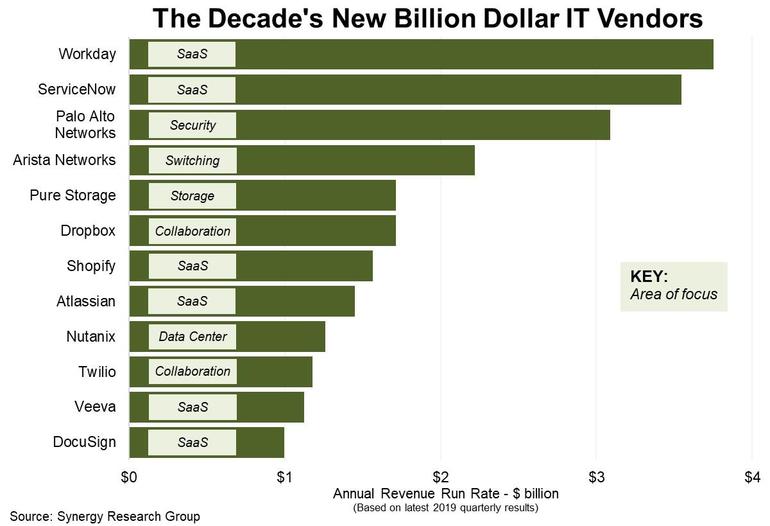How your organization could benefit from using a top tech startup

Only 12 IT services companies have achieved $1 billion or more in annual revenue. And there are advantages to using such vendors, according to Synergy Research Group.
Choosing a vendor to provide IT services for your company can be a challenging task. You may want to consider an older, established, legacy vendor that’s proved itself over the long haul. Or you may opt for a startup vendor that can offer newer and more innovative ideas and approaches.
Selecting a startup vendor can carry some risks but choosing one that’s survived and thrived to generate hefty revenue offers certain benefits, according to Synergy Research Group.
SEE: Launching and building a startup: A founder’s guide (free PDF) (TechRepublic)
In a review of enterprise IT markets over the last 10 years, Synergy Research Group found 12 startup vendors with annual revenue of $1 billion or more based on the latest 2019 quarterly results. Further, the vendors identified either started up over the past decade or had minimal revenue just 10 years ago.
Leading the group are Workday, ServiceNow, and Palo Alto Networks, all with a combined revenue of more than $10 billion compared with less than $100 million in 2009.
Next, Arista Networks passed the $2 billion mark in revenue for the latest quarter. The eight other companies on the list—Pure Storage, Dropbox, Shopify, Atlassian, Nutanix, Twilio, Veeva, and DocuSign—have each generated $1 billion or more for the last quarter. In total, all 12 vendors now have a revenue run rate of over $23 billion compared with just $200 million in 2009.
Synergy Research Group
Beyond these top 12 vendors, other startups have done well over the past decade, according to Synergy. Tableau Software would have made the list had it not been acquired by Salesforce in a deal valued at almost $16 billion.
Two vendors that might have come close if they hadn’t been acquired are Nimble Storage and Ruckus Wireless. Two other vendors who started up later in the decade but have been generating healthy revenue are Zoom and Slack. Further, three vendors who are coming close to the billion-dollar revenue mark are RingCentral, Zendesk and Box.
Why have the 12 identified startups seen such a dramatic increase in revenue?
“They have used innovative new technology to successfully target specific applications and use cases that have a broad enterprise appeal,” said John Dinsdale, chief analyst & research director for Synergy Research Group. “In some cases these needs were not being adequately met by existing products and solutions; in other cases the new technology stimulated new demand.”
Another factor that distinguishes the 12 startups is their ability to survive and thrive.
“The vast majority of startups fail,” Dinsdale said. “Either they fail to get off the ground or the level of business achieved is far below what was expected. Very few achieve critical mass and gain substantial market share in key segments. That is what sets these 12 apart.”
Startup benefits
The success of these startups can prove useful to IT professionals, business owners, and even investors searching for the right vendors. Dinsdale described the specific benefits of using such startups:
- For IT pros. Choosing to source important products and solutions from recently formed new companies always carries some level of risk, but that has to be balanced by the fact that the most innovative new technology does come from startups. It is in their DNA and they are not constrained by having to worry about cannibalizing existing legacy business. Be very open to approaches from startups but also be realistic about their likely longevity. If carefully chosen, startups can solve big problems that legacy tech vendors struggle to solve.
- For business owners and managers. It is right to be a little cautious about relying on a startup tech vendor, but being overly conservative can prevent you from having access to the innovative new solutions, many of which bring financial and operational benefits.
- Investors. Be aware that most tech startups fail and so you ought to have some tools and knowledge to help filter out likely winners. Clearly in the tech world it is possible for startups to make a big name for themselves and to drive huge growth in company value. Company value can have little direct relationship with actual revenues, but here are good examples where investors could have won big time if they invested/divested at the right time.

Image: Iurii Motov, Getty Images/iStockphoto



